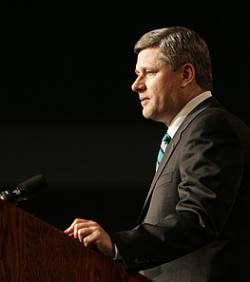NEWS RELEASE
PRIME MINISTER OF CANADA
******************** Prime Minister Harper launches Operation Lancaster to assert Canadian sovereignty in the Arctic
August 12, 2006 Iqaluit, Nunavut
Prime Minister Stephen Harper today launched Operation LANCASTER, a 12-day military exercise in the eastern Arctic designed to assert Canada's sovereignty in the North.
Speaking to a combined audience of Canadian Forces soldiers and Nunavummiut, Prime Minister Harper said the mission demonstrates his government's commitment to defending Canada’s territorial integrity.
"It takes a Canadian presence on the ground, in the air and on the sea and a government that is internationally recognized for delivering on its commitments."
Noting that Canada’s sovereignty in the Arctic is recognized by 150 countries that have ratified the United Nations Convention on the Law of the Sea, Prime Minister Harper said the federal government is undertaking numerous measures to enforce Canada’s control over the Arctic.
"The North is poised to take a much bigger role in Canada's economic and social development," the Prime Minister said. "We must ensure the unique ecosystem of the North, and the unique cultural traditions of the First Peoples of the North, are respected and protected."
******************** Full text of Prime Minister's speech
Good morning. Ublakut.
Thank you for your warm welcome.
And thank you Paul (Okalik) for your generous introduction.
Mr. Premier,
Commissioner Hanson,
Minister O`Connor,
Colonel Whitecross,
Mayor Sheutiapik,
Elders and citizens of Iqaluit,
I am very pleased to be in Iqaluit, Canada's newest capital. Your city is my first stop on my first tour of the North since becoming Prime Minister.
Over the next several days I'll be making two more stops in Nunavut: the Alert military base at the very northern tip of Canada and the new Jericho diamond mine in western Nunavut.
In addition, I'll be visiting the capitals of Yukon and the Northwest Territories, Whitehorse and Yellowknife.
I'm especially pleased to be here on Canadian Forces Day so I can observe first-hand the army, navy and air force in action at the launch of Operation Lancaster.
It is always an honour to be among the men and women of our Armed Forces again.
Across the country and around the world, Canadian troops are doing vitally important work for our country.
Defending our sovereignty, protecting our national interests, helping people in dire straits and fighting for democracy, freedom and the rule of law.
As Prime Minister, one of my first actions was to visit our brave soldiers in Afghanistan.
As you know, they are doing an outstanding job, in extremely difficult and dangerous circumstances.
I also made it a priority to meet new recruits graduating from training at CFB Wainwright and CFB Ottawa.
And during our recent trip to Europe and the G8 Summit in Russia, Laureen and I stopped in France to pay our respects to the Canadians who fell at Vimy Ridge.
At each stop, I saw – past and present – displays of hard work, courage and dedication to Canada.
I want you to know that our new National Government is very proud of our military.
And you can count on our full support on this and all your future missions.
Operation Lancaster is a very important exercise.
Because it demonstrates our new Government’s commitment to asserting Canada’s sovereignty over our Arctic territory.
A commitment I made last December when I promised to ensure that Canada’s jurisdiction over the islands, waterways and resources in the High Arctic is respected by all nations.
But you can't defend Arctic sovereignty with words alone.
It takes a Canadian presence on the ground, in the air and on the sea and a Government that is internationally recognized for delivering on its commitments.
That's why exercises such as this one are so important.
And that's why we are being absolutely clear and forthright in all our foreign policy pronouncements.
If you want to be taken seriously by other countries, you have to say what you mean and mean what you say.
And I am here today to make it absolutely clear there is no question about Canada's Arctic border.
It extends from the northern tip of Labrador all the way up the East coast of Ellesmere Island to Alert.
Then it traces the western perimeter of the Queen Elizabeth Islands down to the Beaufort Sea.
From there it hugs the coasts of the Northwest Territories and Yukon to the Canada-U.S. border at Alaska.
All along the border, our jurisdiction extends outward 200 miles into the surrounding sea, just as it does along our Atlantic and Pacific coastlines.
No more. And no less.
Canada’s Arctic sovereignty is firmly anchored in history.
Almost 100 years ago, in 1909, a plaque was installed on Melville Island by famed Quebecois seaman Joseph Bernier, captain of the Canadian government ship Arctic.
It proclaimed, on the ground for the first time, Canada’s sovereignty over the entire Arctic archipelago.
>From the 1920s through the 1940s, the great Canadian navigator Henry Larsen patrolled our Arctic waters aboard the famous RCMP schooner St. Roch.
Larsen's many voyages upheld the first principle of Arctic sovereignty: Use it or lose it.
In the 1980s, the Conservative government of Brian Mulroney won recognition of our Arctic possessions under International Law.
Canada became one of 150 nations – including most European countries, Russia, India and China – to ratify the United Nations Convention on the Law of the Sea.
